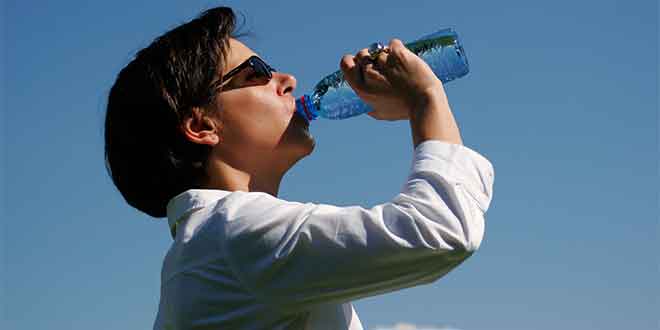
“I’m Dying Of Thirst!”
Did you know that you could die of thirst? Well if you don’t die you might seriously be dehydrated that can have severe repercussions on your health. When you’re thirsty, you’re already dehydrated. That’s right, most of us reach for a glass of water once our body registers that we are thirsty, but in reality, that is our body’s last measure or resort to make sure we hydrate and keep our bodies working efficiently.
Water is important to the mechanics of the human body. The body cannot work without it, just as a car cannot run without gas and oil. Water is our lifeline that bathes us and feeds us. You need to spend all day replenishing that water.
Chronic dehydration can cause sickness and premature aging, and when we are dehydrated, the body begins to pull water from its organs and tissues, which is a desperate measure and should be avoided. Ending your chronic dehydration will do wonders for your overall health. Trust me, you’ll feel like a million bucks. But here are a few things to watch out for:
Feeling Tired and Sluggish
Feeling cranky, fatigued and unable to focus? You might just need a drink of water. Dehydration can be a cause of fatigue when you have chronic fatigue syndrome. Nearly all body functions are about fluid balance, and even small changes in fluid balance can affect our performance and daily life. As dehydration progresses, the body transmits blood to the working muscles and away from the skin, impairing your body’s ability to diffuse heat. The increase in internal heat then results in muscle cramps, light-headedness, and fatigue.
High Blood Pressure
Hydration also can be a cause of high blood pressure by making the body to hold onto sodium. This increases blood volume and thus blood pressure. If you don’t drink enough water, you don’t put enough water in your blood causing your blood to become too thick. Make a point of drinking a minimum of eight and preferably 10 to 12 glasses of pure, filtered water every day. This surprisingly simple step can truly make a difference in blood pressure control.
Asthma and Allergies
A water rationing system takes effect immediately in response to any form of dehydration. A neurotransmitter named Histamine becomes active and redistributes water throughout the body. Histamine’s responsibility is to ensure that these vital organs have enough water to function properly during times of dehydration.
If the dehydration issues become chronic, then water must be taken from major regions within the body. The most common symptoms associated with dehydration and elevated histamine include allergies, asthma, dyspepsia, colitis, constipation, rheumatoid arthritis, migraine headaches and chronic pain.
High Cholesterol
The reason for high cholesterol in the body is because of complications caused by chronic unintentional dehydration and insufficient urine production.
Dehydration produces concentrated, acidic blood that becomes even more dehydrated during its passage through the lungs before reaching the heart – because of evaporation of water in the lungs during breathing. When dehydration causes too much liquid to be removed from inside the cells, the body tries to stop this loss by producing more cholesterol.
Kidney Problems
Dehydration results when there is a deficiency in the body’s water supply. If the brain and kidneys are functioning properly, the body will be able to manage minor changes in water intake. It’s usually possible to drink enough water to make up for any water loss.
Digestion Problems and Constipation
If you don’t have enough water in your body already. If you’re dehydrated, the large intestine soaks up water from your food waste. This makes hard stools that are difficult to pass. Dehydration is one of the most common causes of chronic constipation.
The food you eat makes its way from your stomach to the large intestine, or colon. Water is important for your digestion. It keeps the food you eat moving along through your intestines and it keeps your intestines smooth and flexible, too.
Gaining Weight
Dehydration affects the ability of your body to burn fat, encourages excessive calorie consumption and slows down your metabolism. This leads to excess fat being stored in your body, including around your stomach. The less water in your tissues, the less you weigh. When your body realizes it is getting enough water, it will allow you to release retained waters from your cells through digestion.
Skin Problems
Dehydration of the skin can lead to significant signs of premature aging and if not treated, can cause more serious conditions both internally and externally. In order to counteract the effects of this condition, one must be aware of how the skin can become dehydrated and how to restore essential skin balance. Dehydrated skin can appear flaky, red, scaly and rough and is easily prone to wrinkles.
Water makes up more than half of your body weight. You lose water each day when you go to the bathroom, sweat, and even when you breathe.
Tips for Staying Hydrated
- Keep a bottle of water with you during the day. Carry a reusable water bottle and fill it from the tap instead.
- If you don’t like the taste of plain water, try adding a slice of lemon or lime to your drink.
- Be sure to drink water before, during, and after a workout.
- When you’re feeling hungry, drink water. Thirst is often confused with hunger. True hunger will not be satisfied by drinking water. Drinking water may also contribute to a healthy weight-loss plan. Some research suggests that drinking water can help you feel full.
- If you have trouble remembering to drink water, drink on a schedule. For example, drink water when you wake up; at breakfast, lunch, and dinner; and when you go to bed. Or drink a small glass of water at the beginning of each hour.

